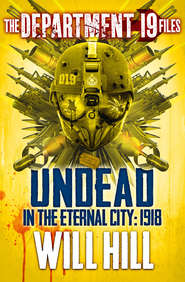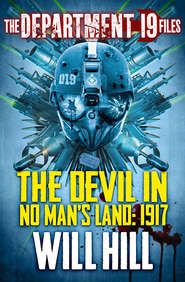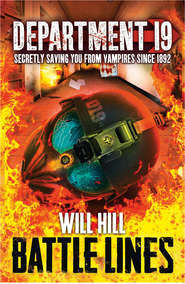По всем вопросам обращайтесь на: info@litportal.ru
(©) 2003-2024.
✖
Department 19
Автор
Год написания книги
2019
Настройки чтения
Размер шрифта
Высота строк
Поля
Seward and Holmwood both agreed that they were.
“In which case,” Van Helsing said. “I see no reason to make the Prime Minister wait. I will despatch our answer immediately.”
Chapter 11
THE MORNING AFTER
Jamie woke shortly before dawn.
He raised his groggy head from the pillow and saw an IV drip running down to a needle that had been placed in his forearm. He didn’t remember its insertion; didn’t remember much of how the previous day had ended, after the girl had attacked him in the hangar.
He pushed back the sheets and blankets and swung his legs off the bed. He was wearing a white medical robe, and was scanning the room for his clothes when a wave of nausea rolled through him and he thought for a horrible second that he was going to vomit. His throat hurt and it was painful to breathe. He raised a hand to his neck, felt a swollen ridge of flesh tender to the touch, and winced. He closed his eyes and lowered his head between his knees, and after a minute or two the sick feeling passed. He was about to get down from the bed when the door at the end of the room opened and a doctor walked briskly into the infirmary.
“Mr Carpenter,” the doctor said. “Please lie back down.”
The man’s voice was familiar and full of authority, and Jamie did as he was told. The doctor examined his bruised throat, pricked his finger and drew blood, shone a small flashlight in his eyes, then slid the needle out of his arm and pronounced him much improved.
“How do you feel?” he asked Jamie.
“I feel OK,” he replied, rubbing the neat circular bruise left by the needle. “I don’t really remember how I got here. Did Frankenstein bring me?”
The doctor nodded.
“Brought you in, then stayed with you most of the night. He only left a couple of hours ago. He asked me to remind you when you woke up that you are to go and see him before you talk to anybody else. He asked me to make sure you understood that. Do you?”
“I suppose so.”
The doctor drew a PDA from his pocket and tapped a number of keys with the plastic pen.
“I want you to come back and see me this afternoon,” he said. “The bruising is down, and you’re no longer dehydrated. You may still be suffering from a degree of post-traumatic stress, but under the circumstances I’m going to discharge you. Is that what you wish?”
Jamie nodded.
“OK then. Rest here as long as you like, and when you’re ready you can get dressed and go and find your friend. He asked me to give you this.”
The doctor reached into his pockets again, withdrew a piece of paper and handed it to Jamie. On it, written in a beautiful cursive handwriting, were two short lines of text.
Level E Room 19
Jamie took it from the doctor’s hand without a word. The man hovered for a moment, as if slightly unsure of what to do next, then favoured Jamie with a smile and a brief nod of his head and walked back out of the infirmary.
Jamie lay still for a few minutes, then sat back up, grunting at the pain in his neck and arm, and pushed himself off the bed. He wobbled, his legs unsteady beneath him, and reached out and gripped the top of the white cabinet. As his equilibrium returned, he looked around and saw his clothes, neatly folded on a low shelf on the other side of the infirmary. He walked gingerly over to them and dressed himself, slowly, searching for the memories of the previous night. Then he looked around the infirmary, and gasped as his faltering memory was jolted into life.
A man was lying in one of the beds on the other side of the room, his eyes closed, his chest rising and falling slowly. Jamie walked over and stood beside him, watching the man breathe. His skin was brighter than it had been the previous night, but it was still pale. His right arm was swathed in bandages, and blood ran steadily from an IV hung above his bed. Jamie watched, fascinated, as the crimson liquid crawled down the plastic tube and slid into the man’s vein.
There was someone else. There was a boy.
The memory hit him hard, and he looked over at the door marked THEATRE. A dark shape lay beyond the frosted glass, and he walked towards it. He hesitated, standing in front of the door, then pushed it slowly open.
The teenager lay in a single bed in the middle of the room. Beside him, a tall array of equipment beeped and flashed steadily, and a green line spiked slowly, over and over. Wires ran from the machines and were attached to the boy’s chest and arms. His eyes were closed, and his skin was ghostly white. Jamie stood by the door, frozen, staring at him.
He’s my age. He’s just a kid.
Slowly, he crossed the room and stood beside the starched white bed.
“What happened to you?” he whispered.
“He was bitten,” replied a voice from behind him, and Jamie’s heart leapt in his chest. He spun around, and saw the doctor who had examined him standing in the open doorway. “What are you doing in here?” the man asked.
“I remembered seeing him in the hangar,” replied Jamie. “Is he going to be all right?”
“Did you touch anything?” asked the doctor, ignoring Jamie’s question.
He shook his head. “Is he going to be all right?” he repeated, his voice rising ever so slightly.
The doctor walked to the end of the bed, pulled a metal chart from a clip, scanned it quickly, and replaced it. Then he rubbed his eyes, and looked at Jamie.
“It’s too early to say,” he said, softly. “He lost an enormous amount of blood, and his heart stopped as we were transfusing. We resuscitated him, but his brain may have been damaged by the lack of oxygen. We induced a coma, to give him the best chance. Now we just have to wait.”
Jamie stared blankly at the doctor.
His heart stopped. We induced a coma. His heart stopped.
“How long?” he managed. “How long until you know if he’s all right?”
The doctor shrugged.
“A few days, maybe longer. Once the swelling on his brain has gone down, we’ll wake him up. And then we’ll see.”
The man shook his head quickly, and when he looked at Jamie again he was all business.
“Go on, get out of here,” he said. “Go and find Colonel Frankenstein. And don’t come in here again without permission. This boy is in a very delicate condition, and the next twenty-four hours are vital.”
Jamie backed towards the door, unable to tear his gaze from the teenager’s blank, pale face. There were no lines on his skin, no wrinkles or blemishes; he looked like a mannequin.
“What’s his name?” he asked, as he reached the open door.
“Matt,” said the doctor, who was consulting the chart for a second time. He didn’t look up as he answered. “Matt Browning.”
Jamie walked down the corridor outside the infirmary, keeping his eyes on the grey walls, looking for a lift. Just before the corridor ended in a flat black screen that stretched from floor to ceiling, he saw a button marked CALL outlined on the wall to his right. He pressed his thumb to the button and waited.
Seconds later the wall in front of him slid open, revealing a metal lift, He stepped inside, and examined the fluorescent yellow buttons set into a black panel at waist height; they were marked 0, A, B, C, D, E, F, G and H, and the C button was glowing red.
Well at least I know where I am. That’s a start.
He looked at the piece of paper the doctor had given him.
Level E. Two more floors down.











